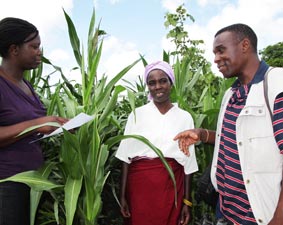
Farmers in Balaka, Malawi, prefer CA

If Chrisy Samson Mpomola, a farmer in Malawi, were to choose a method of farming for her whole farm, she would choose the conservation agriculture (CA) method, with no ridges, where maize is intercropped with pigeon peas and herbicide applied (only Glyphosate) for weed control. Why? “Because the work is not so difficult, we leave the residue on the ground, and the crop that grows has a good stand,” she said. “I think this is a profitable farming method, and my neighbors admire my crop, she continued. As a result of this, early adopters have emerged, who imitate what she has done on her land. “Using my conventional farmers’ practice, I used to get four to five bags of maize; now I anticipate getting 20 bags.” A neighbor, Alice Mpochera says she admires Chrisy’s CA crop, and although she does not know much about the project, she can see that the crop grown on Mpomola’s farm appears to have a high yield and she would be interested in learning more about the improved farming methods used.
Chrisy is married to Afiki Mpomola, and they have six children, three of whom are married. Chrisy has been farming for about 30 years, and the family owns a total of four acres. Apart from maize and groundnuts, they also grow cotton and pigeon peas as cash crops. The groundnuts are grown both for subsistence as well as for income. Six treatments have been implemented on Chrisy and Afiki’s fields: planting on ridges, which is also referred to as farmers’ practice; basin planting under conservation agriculture (CA); CA with no ridges where maize is intercropped with pigeon peas, and Glyphosate herbicide used to control weeds; CA under sole maize, planted using a dibble stick; CA under groundnuts; and CA on a rotation of maize and groundnuts basis.
The SIMLESA selection process for farmer participation in Malawi is a ‘democratic’ one; farmers were asked to nominate one amongst the group, whom they considered to be industrious, these names were placed in a box, and the results tallied. The farmer with the most votes was chosen as the participating farmer. The Mpomolas were chosen by community members due to their reputation as hard-working farmers.
According to SIMLESA project coordinator, Dr. Mulugetta Mekuria, “the idea here is to help farmers consider the different options available, and then choose which method works best for them, and thus help improve their income. We are transferring research experiments to farmers’ plots to see how these perform,” he said. “I am very happy to be part of the project and if we continue in this way, my livelihood will improve”, Chrisy concluded.